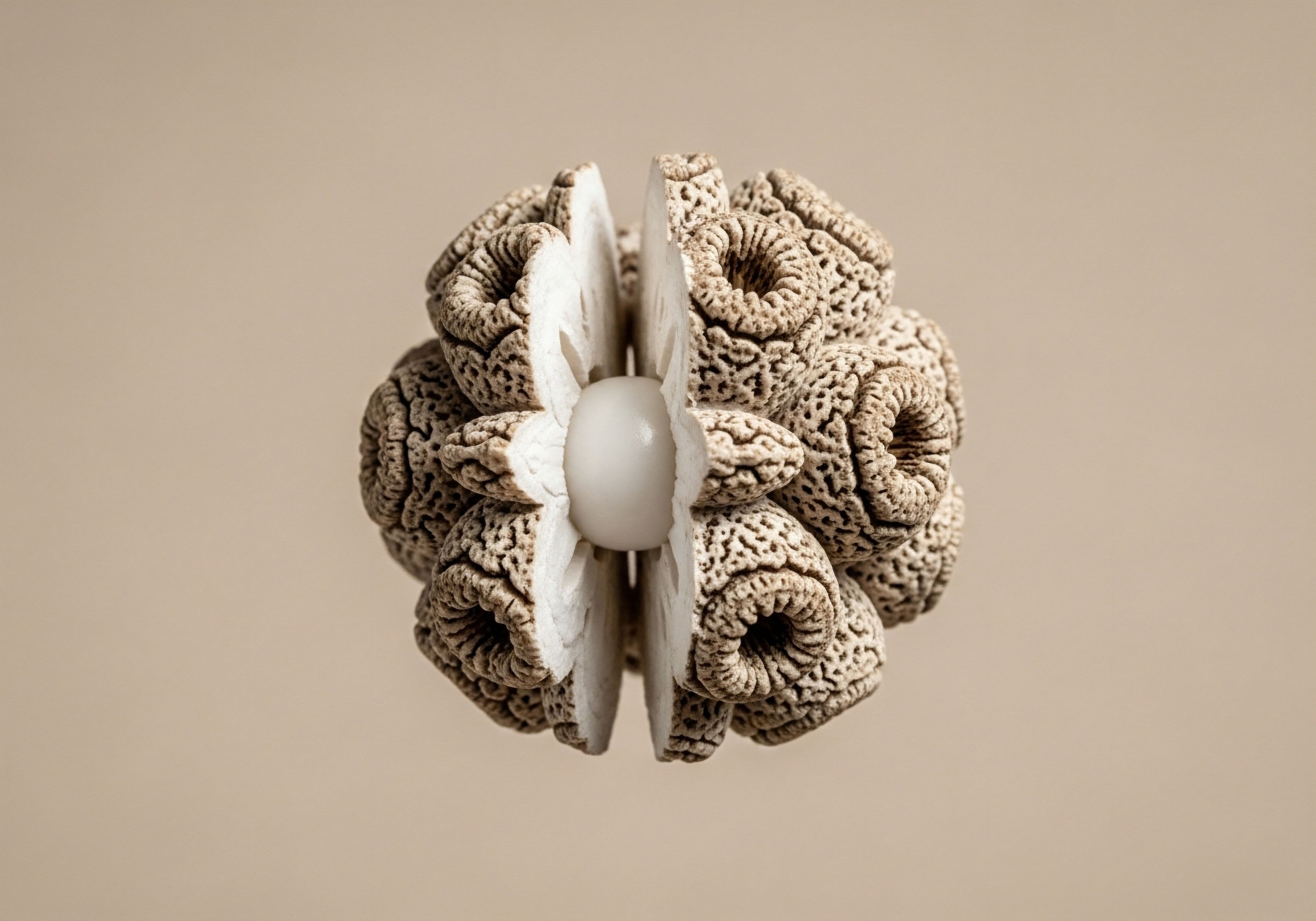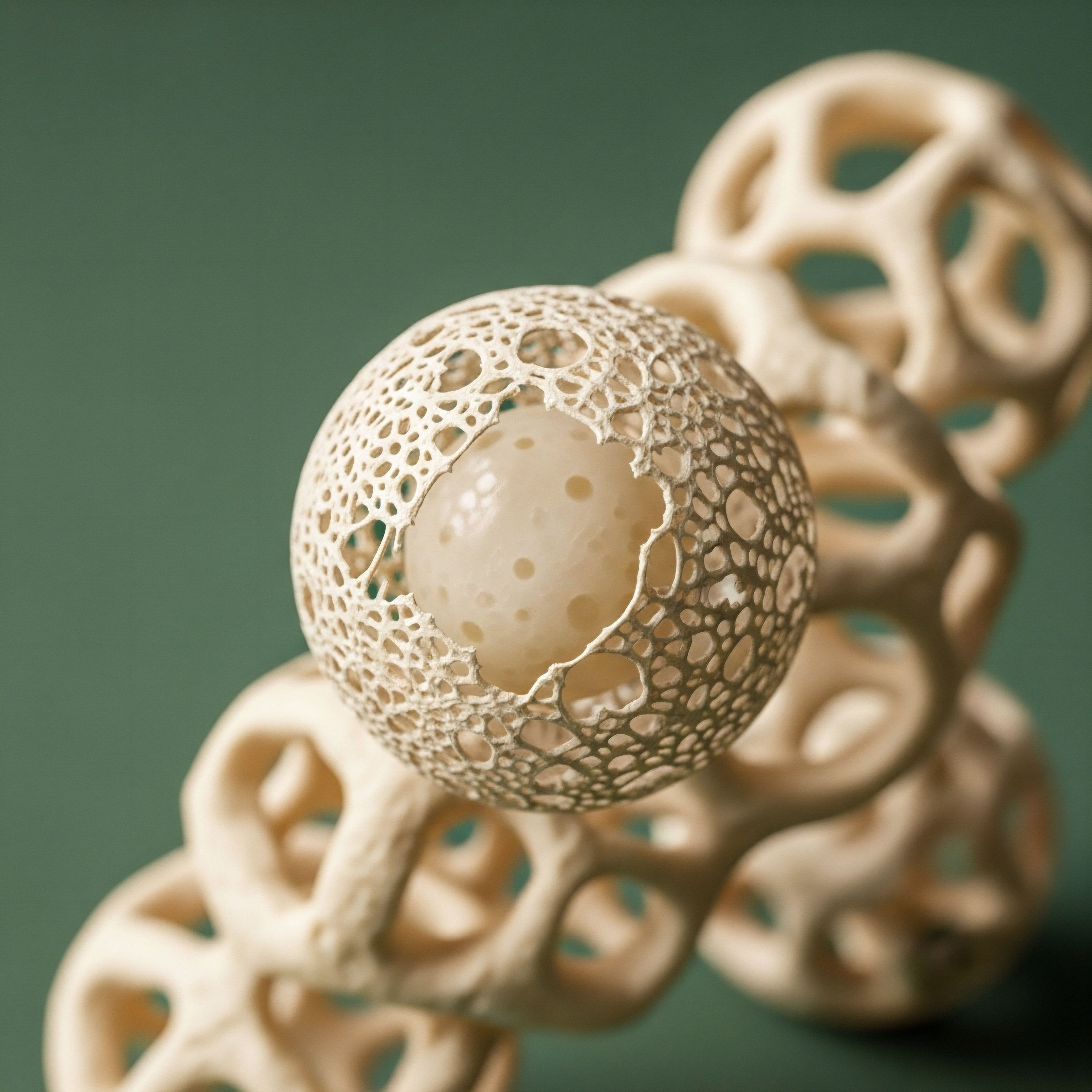

Fundamentals
You feel a shift. It’s a subtle change at first, a gradual dimming of vitality that’s difficult to pinpoint. The energy that once propelled you through demanding days now seems to wane sooner. Sleep offers less restoration. Your body’s responses, including those related to sexual wellness, feel different, less predictable.
This experience is a deeply personal, often silent, recalibration of your internal world. The path to understanding this change begins not with a diagnosis, but with an exploration of the body’s own communication network ∞ the endocrine system. Your hormones are the messengers in this system, and peptides are the words they use. Understanding their language is the first step toward reclaiming your functional vitality.
At the heart of this conversation are two distinct yet complementary approaches to wellness ∞ hormone replacement therapy (HRT) and peptide therapies. HRT is a protocol of biochemical recalibration. It involves supplementing hormones like testosterone or estrogen to restore levels that have declined due to age or other factors.
This process can be likened to ensuring the body’s primary messengers are present in sufficient numbers to carry out their essential duties, influencing everything from mood and metabolism to libido and bone density. It is a foundational strategy aimed at restoring a hormonal environment conducive to optimal function.
A combined therapeutic approach can offer a more comprehensive restoration of hormone balance and overall health.
Peptide therapies, conversely, operate with more specific instructions. Peptides are short chains of amino acids, the fundamental building blocks of proteins. They act as highly specific signaling molecules, each designed to trigger a particular cellular action. For instance, a peptide like PT-141 (Bremelanotide) doesn’t introduce a hormone; it communicates directly with the central nervous system to influence pathways of sexual arousal.
It works by activating specific melanocortin receptors in the brain, which in turn modulate neurotransmitters like dopamine that are integral to desire. This approach targets the neurological origins of sexual response.
The question of combining these two powerful modalities is a logical one. If HRT restores the foundational hormonal landscape, peptide therapies can provide targeted enhancements within that landscape. The two are not mutually exclusive; they represent a coordinated effort.
Hormonal optimization creates a system that is more receptive to the specific signals sent by peptides, potentially amplifying the benefits of both. This integration recognizes that sexual wellness is a complex interplay of systemic hormonal balance and specific neurological signaling. The body is a single, interconnected system, and addressing its needs from multiple angles is a sophisticated and effective strategy for wellness.


Intermediate
When we move from the foundational concepts to clinical application, the conversation shifts to protocols and synergy. Combining peptide therapies for sexual wellness with hormone replacement therapy (HRT) is a clinical strategy designed to address health from two different, yet synergistic, levels of biological organization. HRT establishes a baseline of endocrine health, while peptides provide targeted functional support. The decision to integrate them is based on a comprehensive understanding of an individual’s unique physiology, symptoms, and wellness objectives.

Protocols for Hormonal Optimization
Hormone replacement is the bedrock of this combined approach. The goal is to re-establish a physiological hormonal environment that supports overall vitality, including sexual function. The protocols are tailored to the individual’s specific needs, identified through symptomatic presentation and detailed laboratory analysis.
For men experiencing the effects of andropause, a standard protocol often involves Testosterone Cypionate. This bioidentical hormone restores systemic testosterone levels, addressing symptoms like low libido, fatigue, and loss of muscle mass. This is frequently paired with Gonadorelin, which helps maintain the body’s own testosterone production pathways, and Anastrozole, an aromatase inhibitor used to manage the conversion of testosterone to estrogen, thereby mitigating potential side effects.
For women, particularly in the perimenopausal and postmenopausal stages, hormonal optimization is a nuanced process. It may involve low-dose Testosterone Cypionate to address libido and energy, along with Progesterone to support mood and sleep. The specific combination and delivery method, whether injections or pellets, are determined by the individual’s hormonal profile and personal preferences. This careful balancing act aims to restore the intricate hormonal interplay that governs female health.

Integrating Peptide Therapy What Is the Mechanism of Action?
With a stable hormonal foundation established, peptide therapies can be introduced to target specific aspects of sexual wellness. PT-141, or Bremelanotide, is a prime example of a peptide used for this purpose. Its mechanism of action is distinct from that of hormones and provides a complementary benefit.
PT-141 is a melanocortin receptor agonist. It works by binding to and activating the MC3R and MC4R receptors located in the central nervous system, particularly within the hypothalamus. This activation initiates a cascade of neurological signals that enhance sexual arousal and desire.
This is a key distinction from many other sexual wellness treatments that focus on peripheral vascular effects, such as increasing blood flow. PT-141 addresses the central, neurological component of libido. Because it operates on a different biological pathway, it can be safely and effectively combined with HRT.
PT-141 is FDA-approved for Hypoactive Sexual Desire Disorder (HSDD) in premenopausal women, demonstrating its clinical validity in addressing centrally-mediated libido issues.
The following table illustrates how these two therapies address different facets of sexual wellness, creating a comprehensive treatment plan.
| Therapeutic Modality | Primary Mechanism of Action | Target System | Primary Benefits for Sexual Wellness |
|---|---|---|---|
| Hormone Replacement Therapy (HRT) | Restores systemic levels of key hormones like testosterone and estrogen. | Endocrine System (Systemic) | Improves baseline libido, energy, mood, and physiological responsiveness. |
| PT-141 Peptide Therapy | Activates melanocortin receptors in the central nervous system. | Nervous System (Central) | Directly enhances sexual desire and arousal pathways in the brain. |

What Are the Safety Considerations for Combined Therapy?
The combination of HRT and peptide therapies like PT-141 is generally considered safe when overseen by a qualified healthcare practitioner. Peptides are naturally occurring biological molecules, and when used correctly, they have minimal side effects. The most common side effects associated with PT-141 are transient and may include nausea, flushing, and headache.
Proper screening and ongoing monitoring are essential to ensure safety and efficacy. This includes baseline and follow-up laboratory testing to monitor hormone levels and other relevant health markers. The goal of this integrated approach is to create a powerful, personalized protocol that optimizes health from both a systemic and a targeted perspective, leading to a profound improvement in quality of life.


Academic
An academic exploration of the co-administration of peptide therapies with hormonal optimization protocols requires a deep dive into the distinct yet convergent pathways through which these agents exert their effects. The synergy arises from a multi-tiered impact on human physiology, addressing both the foundational endocrine state and the specific neuro-regulatory circuits governing sexual response.
This integrated strategy is predicated on the understanding that sexual wellness is not a monolithic function but an emergent property of complex interactions between the endocrine, nervous, and vascular systems.

The Hypothalamic-Pituitary-Gonadal Axis and Hormonal Priming
Hormone Replacement Therapy (HRT) functions by restoring homeostasis within the Hypothalamic-Pituitary-Gonadal (HPG) axis. In males, Testosterone Replacement Therapy (TRT) directly elevates serum testosterone, compensating for diminished Leydig cell function. The inclusion of Gonadorelin, a GnRH analogue, is a sophisticated intervention designed to prevent testicular atrophy by maintaining pulsatile stimulation of the pituitary, thereby preserving endogenous luteinizing hormone (LH) secretion.
Anastrozole, an aromatase inhibitor, further refines the hormonal milieu by controlling the peripheral conversion of testosterone to estradiol, a critical factor in maintaining a favorable androgen-to-estrogen ratio.
In females, hormonal protocols are designed to replicate the complex hormonal fluctuations of the menstrual cycle or establish a stable postmenopausal state. The judicious use of testosterone, progesterone, and sometimes estrogens, addresses the multifactorial nature of female sexual dysfunction, which is linked to deficiencies in all three hormone classes.
By establishing a eugonadal state, HRT effectively “primes” the system, ensuring that the cellular machinery responsive to sexual stimuli is functioning optimally. This includes enhancing the health of genital tissues, supporting baseline neurotransmitter levels, and fostering a general state of well-being conducive to sexual expression.
Bremelanotide’s efficacy is rooted in its ability to modulate central nervous system pathways that are distinct from the peripheral vascular mechanisms targeted by other therapies.

The Neurobiology of PT-141 a Central Approach
PT-141 (Bremelanotide) operates within a completely different biological domain. As a synthetic analogue of alpha-melanocyte-stimulating hormone (α-MSH), it is a potent agonist of central melanocortin receptors, specifically MC3R and MC4R. These receptors are densely expressed in hypothalamic nuclei, including the paraventricular nucleus (PVN) and the medial preoptic area (mPOA), regions critically involved in the regulation of sexual behavior and autonomic function.
Activation of these receptors by PT-141 initiates a downstream signaling cascade that is believed to enhance the release of dopamine, a key neurotransmitter in the brain’s reward and motivation circuitry. This dopaminergic activity is central to the experience of sexual desire and arousal.
The mechanism of PT-141 is thus a direct pharmacological modulation of the brain’s intrinsic arousal pathways. Clinical trials for its FDA-approved indication, Hypoactive Sexual Desire Disorder (HSDD) in premenopausal women, have validated this central mechanism, showing improvements in desire and reductions in associated distress.
The following table provides a comparative analysis of the pharmacodynamic targets and effects of these therapeutic classes.
| Parameter | Hormone Replacement Therapy (e.g. Testosterone) | PT-141 (Bremelanotide) |
|---|---|---|
| Molecular Class | Steroid Hormone | Synthetic Heptapeptide |
| Primary Receptor Target | Androgen Receptors (AR) | Melanocortin Receptors (MC3R/MC4R) |
| Site of Action | Systemic (Peripheral and Central) | Primarily Central Nervous System (Hypothalamus) |
| Effect on Libido | Indirect/Permissive (Restores baseline desire) | Direct/Initiatory (Stimulates acute arousal) |
| Clinical Analogy | Ensuring the orchestra has all its instruments. | Providing the conductor with the musical score. |

Why Is a Synergistic Combination Theoretically Sound?
The theoretical basis for combining these therapies is compelling. HRT creates a permissive endocrine environment where the cellular and physiological prerequisites for sexual function are met. Testosterone, for example, not only influences libido centrally but also maintains the structural and functional integrity of erectile and clitoral tissues. However, in some individuals, particularly those with a strong neurogenic component to their sexual dysfunction, hormonal optimization alone may be insufficient to restore optimal desire and arousal.
This is where PT-141 provides a targeted intervention. By directly stimulating the central arousal pathways, it can overcome a potential deficit in neurological signaling that persists even in a hormonally balanced state. The combination, therefore, represents a comprehensive, multi-pronged attack on sexual dysfunction, addressing both the “hardware” (the hormonally-dependent physical structures) and the “software” (the centrally-mediated neurological commands) of the sexual response system.
This dual approach acknowledges the intricate, systems-level nature of human sexuality and offers a more robust therapeutic solution than either modality could provide in isolation.
- Systemic Foundation ∞ HRT restores the body’s general hormonal milieu, which is essential for overall health and provides the necessary biochemical support for sexual function.
- Targeted Neuromodulation ∞ PT-141 provides a specific, on-demand enhancement of the brain’s arousal circuits, directly addressing the subjective experience of desire.
- Comprehensive Care ∞ The combined protocol allows for a personalized approach, addressing the unique blend of physiological and neurological factors contributing to an individual’s sexual wellness concerns.

References
- Bruice, Kenton. “Optimize Your Metabolism With BHRT and Peptide Therapy.” Kenton Bruice, MD, n.d.
- “Combining Peptides and Hormone Replacement for Optimal Wellness.” n.p. 18 December 2024.
- “Peptides vs. Hormone Therapy ∞ What’s the Difference & Which Wins?.” n.p. 29 May 2025.
- Berman, Jennifer. “PT-141 Therapy.” Dr. Jennifer Berman, n.d.
- “PT 141 Peptide Pros and Cons ∞ Understanding Its Benefits And Risks.” Concierge MD, 1 May 2025.
- Usman, Dr. “Bremelanotide Peptide and HSDD Related-Research.” n.p. 3 March 2025.
- “PT-141 (Bremelanotide) for Sexual Dysfunction ∞ Clinical Guide for Physicians.” eNavvi, 20 May 2025.
- Al-Jebari, Y. et al. “Bremelanotide for Treatment of Female Hypoactive Sexual Desire.” Journal of Clinical Medicine, vol. 11, no. 1, 2022, p. 233.
- “Exploring Bremelanotide ∞ The Science Behind the Promising Drug.” ChemicalBook, 27 March 2024.
- “PT-141 (Bremelanotide) ∞ A Comprehensive Guide to Treating Sexual Dysfunction.” YouTube, 14 March 2025.

Reflection
You have now explored the intricate biological conversations that govern hormonal health and sexual wellness. This knowledge is a powerful tool, a lens through which you can begin to interpret your own body’s signals with greater clarity. The science of hormonal optimization and peptide therapy is a testament to the profound connection between our biochemistry and our lived experience.
Understanding the mechanisms of HRT and peptides like PT-141 is the foundational step. The next is to consider how this information relates to your unique story, your personal sense of vitality, and your goals for the future. Your health journey is a dynamic process of discovery and recalibration. The insights gained here are meant to empower that process, serving as a catalyst for a more informed, proactive, and personalized approach to your own well-being.

Glossary

sexual wellness

endocrine system

hormone replacement therapy

peptide therapies

central nervous system

bremelanotide

melanocortin receptors

hormonal optimization

hormone replacement

testosterone cypionate

gonadorelin

pt-141

melanocortin receptor

nervous system

sexual dysfunction

sexual desire

hypoactive sexual desire disorder




